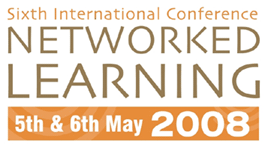

A Collaborative Approach for the Development of Networked Learning Environments Using the ADDURI Framework
Nikolaos Valkanos
Department of Informatics, Alexander Technological Educational Institution
of Thessaloniki, Greece, valkanos@it.teithe.gr
Abstract
Advances in Information and Communication Technologies (ICTs) have made
it possible to reach a large number of distance learners beyond the correspondence
tuition models traditionally used in open and distance learning. Designers
and developers are increasingly working with Virtual Learning Environments
(VLEs) for distance teaching and learning. However, designing and implementing
such learning systems remains a challenge due to the many interrelated
components, factors, choices and many possible approaches. In this paper
we present the ADDURI (Analyse, Design, Develop, Use, Review, Improve)
resource based learning and teaching framework. We analyse the key cross-disciplinary
activities that influence the inter-relationships of the groups in order
to provide a systematic methodology for the development of Collaborative
Networked Learning Environments, and provide guidelines for the adoption
and use of the framework.
The design and realisation of an effective e-learning system involves
multidisciplinary knowledge and collaborative efforts of a spectrum of
scientists, e-learners and educators. E-learning itself is a combination
of many other existing fields and as such, whatever happens in technology,
learning theory, web design, network analysis, etc. impacts and shapes
e-learning.
Effective instruction in any mode is a result of careful planning that
follows a transparent process from the project idea to evaluation and
review. Thus, in developing an e-learning system there is a need to face
the matter in a systemic (holistic) approach.
The ADDURI framework was proposed aiming to integrate know how from information
systems development and instructional design. The goal was to create a
general e-learning framework for offering technology-based learning independent
of teaching methodologies. The framework is flexible in order to allow
different teaching and learning techniques, and thinking tools to be used
for delivering a course. The ADDURI framework consists of six phases,
as its acronym indicates, namely, Analyse, Design, Develop, Use, Review
and Improve. It is largely based on the software development lifecycle
followed by several IS development methods. The framework itself needs
to be adapted to the knowledge needs, technological infrastructure, culture
or any other predefined target of specific organisations. The ADDURI improvement
cycle operates simultaneously at two levels. Each phase is itself a cyclic
process with sub-phases and deliverables feeding into the next phase.
The development of technology-based learning resources follows a self-similar
lifecycle, providing a continuous improvement loop overall and similarly.
The notion of collaboration spans a very broad spectrum of participants,
applications, devices and platforms, from simply sharing information with
another person, department or organisation to unifying communication processes
and content and establishing forms for accessing resources and building
content. The purpose of collaboration is to combine expertise and resources
in order to meet the needs of all learners. What is expected from collaboration
is supportive interactive group learning, shared understanding, social
construction of knowledge and acquisition of competences. During the development
of a networked learning course there are certain groups of people that
collaborate amongst “clusters”. There is also an internal
collaboration amongst the elements within each group. The four “clusters”
or groups are: 1 Field Experts (People knowing the learning domain, such
as teachers/instructors), 2 ICT Experts (ICT staff, methods and tools),
3 Learners (students with different learning preferences and levels of
previous knowledge and experience), 4 Resources (Internal learning material
developed by instructors and students and external learning material in
on-line libraries, web-pages, web 2.0, etc.).
The eLearning initiative of the European Commission seeks to mobilise
the educational and cultural communities, as well as the economic and
social players in Europe, in order to speed up changes in the education
and training systems for Europe's move to a knowledge-based society. Globalisation,
new technologies and demographic developments constitute an enormous challenge;
one of the answers to this problem is the access to lifelong learning.
| About NLC |
2008 Conference Papers
| Conference Committee| Keynote
Speakers
| Papers from previous NL conferences |Research Seminars| Current Conference
| Sponsors | Contact
|
